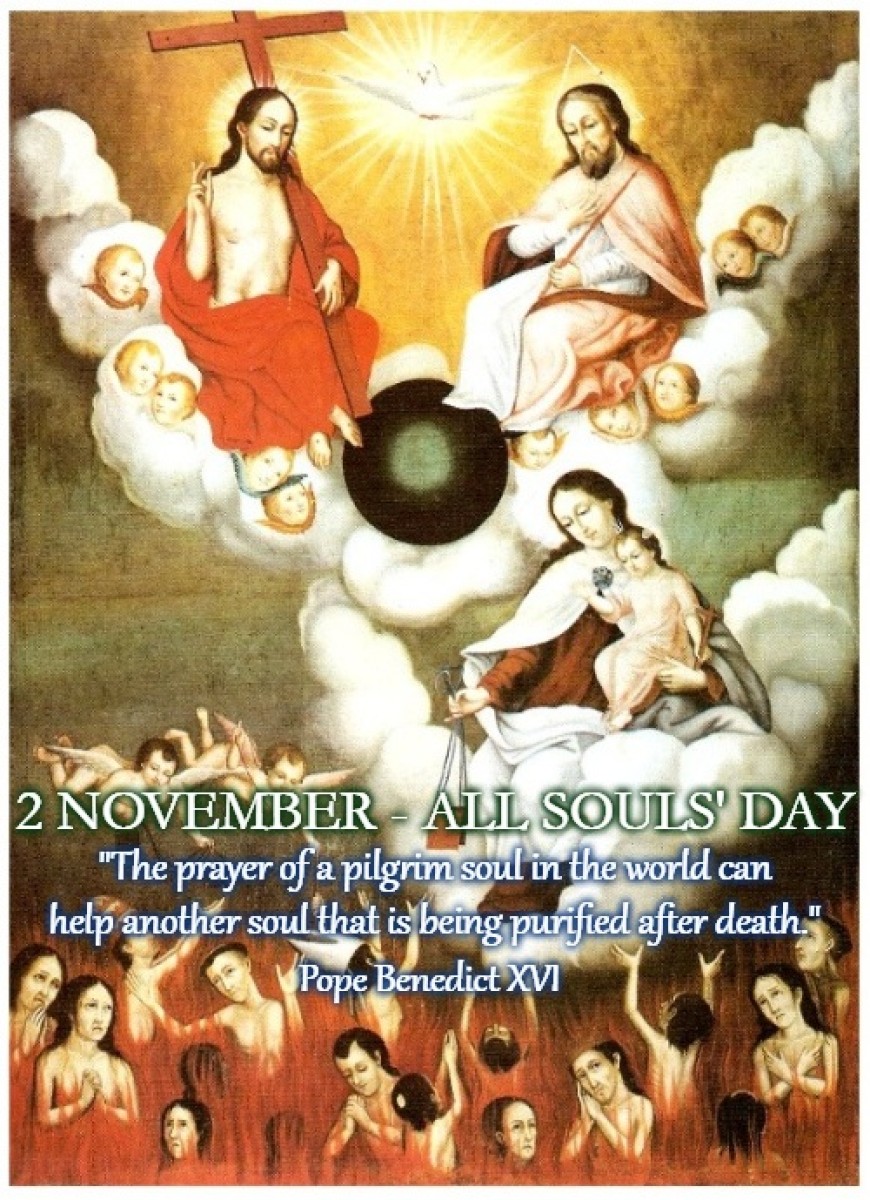All Souls' Day - 2 November 2025
2nd November 2025

“As we enter heaven, we will see them, so many of them coming towards us and thanking us. We will ask who they are, and they will say, ‘A poor soul you prayed for in purgatory.’” - Ven. Fulton Sheen
All Souls' Day commemorates the faithful departed. The celebration is associated with the doctrine that the souls of the faithful who at death have not been cleansed from the temporal punishment due to venial sins and from attachment to mortal sins cannot immediately attain the beatific vision in heaven, and that they may be helped to do so by prayer and by the sacrifice of the Mass. In other words, when they died, they had not yet attained full sanctification and moral perfection, a requirement for entrance into Heaven. This sanctification is carried out posthumously in Purgatory.
Historically, the Western tradition identifies the general custom of praying for the dead dating as far back as 2 Maccabees 12:42-46. The custom of setting apart a special day for intercession for certain of the faithful on November 2 was first established by St. Odilo of Cluny (d. 1048AD) at his abbey of Cluny in 998AD. From Cluny the custom spread to the other houses of the Cluniac order, which became the largest and most extensive network of monasteries in Europe. The celebration was soon adopted in several dioceses in France, and spread throughout the Western Church. It was accepted in Rome only in the fourteenth century. While 2 November remained the liturgical celebration, in time the entire month of November became associated in the Western Catholic tradition with prayer for the departed; lists of names of those to be remembered being placed in the proximity of the altar on which the sacrifice of the Mass is offered.
The legend connected with its foundation is given by Peter Damiani in his Life of St Odilo: a pilgrim returning from the Holy Land was cast by a storm on a desolate island. A hermit living there told him that amid the rocks was a chasm communicating with purgatory, from which perpetually rose the groans of tortured souls. The hermit also claimed he had heard the demons complaining of the efficacy of the prayers of the faithful, and especially the monks of Cluny, in rescuing their victims. Upon returning home, the pilgrim hastened to inform the abbot of Cluny, who then set 2 November as a day of intercession on the part of his community for all the souls in Purgatory.
In His apparitions to St Gertrude the Great, Our Lord had this to say about the merits of praying for those in Purgatory: “My love urges Me to release the poor souls. If a beneficent king leaves his guilty friend in prison for justice’s sake, he awaits with longing for one of his nobles to plead for the prisoner and to offer something for his release. Then the king joyfully sets him free. Similarly, I accept with highest pleasure what is offered to Me for the poor souls, for I long inexpressibly to have near Me those for whom I paid so great a price. By the prayers of thy loving soul, I am induced to free a prisoner from Purgatory as often as thou dost move thy tongue to utter a word of prayer!”
For the Souls in Purgatory – Plenary Indulgence
November is a special time to pray for the dead. A plenary indulgence may be gained for the dead, once only, by visiting a church on 2 November and praying the Lord’s Prayer and the Apostles’ Creed. The conditions required for gaining the indulgence are: to be in a state of grace, go to sacramental confession, receive Holy Communion, and pray for the pope’s intentions.
A partial indulgence may be obtained on other days of the year.
REQUIEM ETERNUM
Eternal rest grant them, O Lord, and let perpetual light shine upon them. May they rest in peace. Amen.
Requirements for obtaining a plenary or partial indulgence:
・Do the work while in a state of grace,
・Receive Sacramental confession within 20 days of the work (several indulgences may be earned per reception),
・Receive Eucharistic communion (one indulgence may be earned per reception),
・Pray for the pope’s intentions (Our Father and Hail Mary, or other appropriate prayer, is sufficient),
・Have no attachment to sin (even venial) – i.e., it is sufficient that the Christian makes an act of the will to love God and despise sin.
An excerpt from the Angelus address given by Pope Benedict XVI at St Peter’s Square on Sunday, 2 November 2008:
Yesterday the feast of All Saints brought us to contemplate “your holy city, the heavenly Jerusalem, our mother” (Preface, All Saints). Today, with our heart still turned toward this ultimate reality, we commemorate all of the faithful departed, who have “gone before us marked with the sign of faith and... who sleep in Christ” (Eucharistic Prayer I). It is very important that we Christians live a relationship of the truth of the faith with the deceased and that we view death and the afterlife in the light of Revelation. Already the Apostle Paul, writing to the first communities, exhorted the faithful to “not grieve as others do who have no hope. For since”, he wrote, “we believe that Jesus died and rose again, even so, through Jesus, God will bring with him those who have fallen asleep” (1 Thes 4: 13-14). Today too, it is necessary to evangelize about the reality of death and eternal life, realities particularly subject to superstitious beliefs and syncretisms, so that the Christian truth does not risk mixing itself with myths of various types.
In my Encyclical on Christian hope, I questioned myself about the mystery of eternal life (see Spe salvi, nos. 10-12). I asked myself: “Is the Christian faith a hope that transforms and sustains the lives of people still today?” (see ibid., no. 10). And more radically: “Do men and women of our time still long for eternal life? Or has earthly existence perhaps become their only horizon?” In reality, as St Augustine had already observed, all of us want a “blessed life”, happiness. We rarely know what it is like or how it will be, but we feel attracted to it. This is a universal hope, common to men and women of all times and all places. The expression “eternal life” aims to give a name to this irrepressible longing; it is not an unending succession of days, but an immersion of oneself in the ocean of infinite love, in which time, before and after, no longer exists. A fullness of life and of joy: it is this that we hope and await from our being with Christ (see ibid, no. 12).
Today we renew the hope in eternal life, truly founded on Christ’s death and Resurrection. “I am risen and I am with you always”, the Lord tells us, and my hand supports you. Wherever you may fall, you will fall into my hands and I will be there even to the gates of death. Where no one can accompany you any longer and where you can take nothing with you, there I will wait for you to transform for you the darkness into light. Christian hope, however, is not solely individual, it is also always a hope for others. Our lives are profoundly linked, one to the other, and the good and the bad that each of us does always effects others too. Hence, the prayer of a pilgrim soul in the world can help another soul that is being purified after death. This is why the Church invites us today to pray for our beloved deceased and to pause at their tombs in the cemeteries. Mary, Star of Hope, renders our faith in eternal life stronger and more authentic, and supports our prayer of suffrage for our deceased brethren.
Prayer for the Souls in Purgatory by St Gertrude the Great
Eternal Father, I offer You the Most Precious Blood of Thy Divine Son, Jesus, in union with the masses said throughout the world today, for all the holy souls in purgatory, for sinners everywhere, for sinners in the universal church, those in my own home and within my family. Amen. 🙏💖💐


